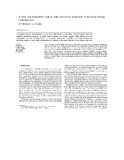| dc.contributor.author | Masoso, O.T. | |
| dc.date.accessioned | 2011-02-09T14:02:39Z | |
| dc.date.available | 2011-02-09T14:02:39Z | |
| dc.date.issued | 2008 | |
| dc.identifier.citation | Masoso, O.T. (2008) A new and innovative look at anti-insulation behaviour in building energy consumption, Energy and buildings, Vol.40, pp.1889-1894 | en_US |
| dc.identifier.issn | 0378-7788 | |
| dc.identifier.uri | http://hdl.handle.net/10311/673 | |
| dc.description.abstract | This paper presents the findings of a case study with building simulation using EnergyPlus dynamic
thermal simulation software, in which wall insulation was varied together with cooling set-point
temperature in a hot and dry climate of Botswana. Against the established norm that adding wall
insulation reduces annual fuel consumption, it is shown in this paper that this is not always the case:
there are instances where adding wall insulation directly increases annual fuel consumption. Initial cost
of insulation aside, as the cooling set-point temperature is gradually increased, the building switches
from an ‘‘insulation reduces cooling load’’ to an ‘‘insulation increases cooling load’’ behaviour. In other
words, the well established knowledge that ‘‘the lower the u-value the better’’ gets overridden by ‘‘the
higher the u-value the better’’. We termed this a ‘‘point of thermal inflexion’’. Simple graphical
demonstration of the existence of this point is presented in the paper. According to the findings, design
engineers and building economics related professionals who quantify investment on insulation can get
disastrous results if they assume that all buildings behave pro-insulation since a building may behave
anti-insulation. | en_US |
| dc.language.iso | en | en_US |
| dc.publisher | Elsevier http://www.linkinghub.elsevier.com/retrieve/pii/S0378778808000923 | en_US |
| dc.subject | Wall insulation | en_US |
| dc.subject | Building energy | en_US |
| dc.subject | Energy simulation | en_US |
| dc.subject | Optimization | en_US |
| dc.subject | Thermal inflexion | en_US |
| dc.title | A new and innovative look at anti-insulation behaviour in building energy consumption | en_US |
| dc.type | Published Article | en_US |

